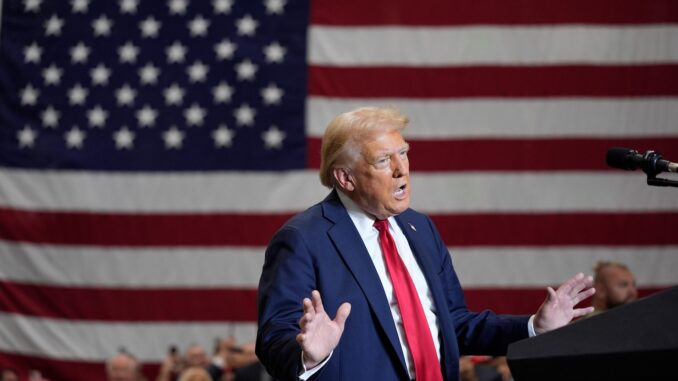
NEW YORK — As Donald Trump hits the homestretch of his White House run, the former president’s lawyers are heading to a New York appeals court in a bid to overturn a civil fraud judgment that could cost him nearly $500 million.
The Republican presidential nominee has given no indication that he plans to attend Thursday’s arguments before a five-judge panel in the state’s mid-level appellate court in Manhattan. The hearing is scheduled to start at noon and is expected to be streamed online.
Trump is asking the court to reverse Judge Arthur Engoron’s ruling in February that he lied about his wealth on paperwork given to banks, insurers and others to make deals and secure loans. The verdict cut to the core of Trump’s wealthy, businessman persona.
Trump has decried the outcome in New York Attorney General Letitia James’ lawsuit against him as “election interference” and accused Engoron of punishing him for “having built a perfect company.” His lawyers contend the verdict was “grossly unjust” and should be reversed.
They contend some allegations should have been barred by the statute of limitations and that the state shouldn’t be policing private business transactions. They have also complained about Engoron’s handling of the case, accusing the judge of “tangible and overwhelming” bias and exceeding his authority.
State lawyers argue there is ample evidence to support the verdict and that Trump’s appeal is based on meritless legal arguments, many of which Engoron and the Appellate Division have rejected before.
D. John Sauer, who successfully argued Trump’s presidential immunity case before the U.S. Supreme Court, will argue on his behalf. Judith Vale, New York’s deputy solicitor general, will argue on behalf of James’ office.
Ruling after a 2½-month trial, Engoron found that Trump had padded his net worth by several billion dollars on annual financial statements by overvaluing assets including his golf courses and hotels, Mar-a-Lago estate in Florida and Trump Tower penthouse in Manhattan.
Trump and his co-defendants are also challenging Engoron’s decision to rule, even before testimony had begun, that the state had proven that Trump had fraudulently inflated his financial statements. The judge ordered Trump and the other defendants to pay $363.9 million in penalties — a sum that has now grown with interest to more than $489 million.
Trump posted a $175 million bond in April to halt collection of the judgment and prevent the state from seizing his assets while he appeals. The bond guarantees payment if the judgment is upheld. If Trump wins he’ll get the money back.
The Appellate Division typically rules about a month after arguments, meaning a decision could come before Election Day. The court could either uphold the verdict, reduce or modify the penalty or overturn Engoron’s verdict entirely.
If either side doesn’t like the outcome, it can ask the state’s highest court, the Court of Appeals, to consider taking the case. Trump has vowed to fight the verdict “all the way up to the U.S. Supreme Court if necessary.”


Be the first to comment